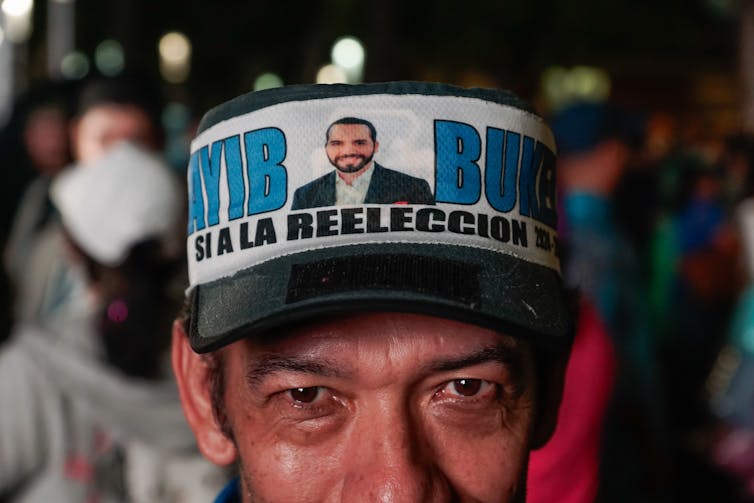There is little doubt who will win the El Salvador presidential election when voters go to the polls on Feb. 4, 2024.
Incumbent Nayib Bukele has the initiative heading into the vote, having made a series of eye-catching decisions since coming to power in 2019, such as making bitcoin legal tender, issuing policy through social media, and most significantly, declaring a nationwide “state of emergency” in response to gang violence.
The Bitcoin experiment has all but failed. But that hasn’t dented his prospects of victory.
The reason: A majority of Salvadorans feel safer than they have in years. Under Bukele’s authoritarian rule, the homicide rate has officially decreased, many street vendors no longer pay a gang tax, and taxi drivers aren’t as worried about hijackings or assault. And that has led to Bukele’s widespread popularity across the country. In an early January 2024 poll, the incumbent was ahead by 71%. He is, in other words, a shoo-in.
But this sense of safety has come at a cost. Bukele’s program to curb crime has led to an erosion of civil rights – tens of thousands of people have been detained in a crackdown on organized crime, with those imprisoned subjected to overcrowding and alleged human rights abuses, including torture.
Critics also point to the breakdown of democratic checks and balances across government since Bukele first took office. He replaced members of the judiciary with allies, and he is running for president again despite constitutional law banning a second consecutive presidential term.
So when Salvadorans cast their votes, they’ll be faced with the question: Is the short-term security Bukele is offering worth the serious backslide on democracy taking place in El Salvador?
Presidential abuse of power
Bukele’s rollback of democratic norms has been relentless. As soon as his political party Nuevas Ideas won a supermajority in the legislature, he purged the Supreme Court of five justices and removed the attorney general, actions that have allowed him to reinterpret articles of the Salvadoran Constitution that ban him from running in this election.
There are, in fact, six articles of the constitution prohibiting presidents from serving a second consecutive term in office. Bukele specifically took aim at Article 152, which stipulates that presidents can’t seek immediate reelection if they served in the previous term for more than six months.
Bukele circumvented the rule by going on leave from presidential duties on Nov. 30, 2023, a move widely regarded as a stunt since he was still campaigning and maintaining the trappings of his office, such as presidential immunity and a security detail. He and members of his administration also pointed to a so-called “hidden article” in the constitution that would allow him to run again, but international legal experts have refuted such a loophole.
As a scholar who studies comparative politics and violence in the Global South and the U.S, I’ve been following the plight of democracy in El Salvador for many years. My working paper in 2022 on Bukele’s democratic backsliding notes, in addition to his remaking of the Supreme Court and firing of the attorney general, legislation that forced into retirement judges and prosecutors over the age of 60. This stalled the trial of the El Mozote massacre of 1981, a lingering trauma from the Salvadoran civil war.
El Salvador’s history of violence
Bukele was elected following two presidents representing the Farabundo Martí National Liberation Front, or FMLN, a former rebel group that’s now a recognized political party. Like Bukele, both of these presidents tried for years to negotiate with gangs while cracking down on them, providing perks for incarcerated gang members in exchange for state input about how and where gang violence transpired. Neither was successful.

In fact, for the majority of Salvadorans, physical violence has been a frequent part of daily life for generations. I have written about the 1932 massacre of Indigenous and working-class people, and the civil war from 1980 to 1992 as critical junctures that inform contemporary Salvadoran politics. The war forced families to flee to the U.S., where boys and young men formed gangs for protection and then were eventually deported back to El Salvador. Gang violence, as well as state violence, has made El Salvador unsafe in the 21st century.
Bukele’s safety agenda and violation of civil rights
Bukele’s “territorial control plan,” launched in 2019 shortly after he was elected, did little to diminish this gang violence. So after gangs murdered 87 people in a single weekend in March 2022, Bukele declared a “state of emergency.” Aimed not only at gangs but journalists and anyone Bukele considers opposition, the state of emergency has, for the past 22 months, seen the suspension of many constitutional rights – including the right to assemble, due process, and privacy in telecommunications.
By the end of 2023, over 74,000 people were incarcerated in the crackdown, with less than a third of those arrested during the state of emergency estimated to be gang members. Many others were charged without proper evidence – on the testimony of neighbors, on the basis of prior arrest records, or simply for having tattoos, as many Salvadorans told me in my 2024 fieldwork.
And once in prison, human rights abuses abound, including torture, inadequate food supply and poor sanitation, according to human rights groups. Family members of incarcerated people I’ve interviewed say that to keep their loved ones alive, they are expected to send food, clothing and hygiene products via packets into the prison at a cost of $100-$300 per month, despite a national monthly minimum wage of just $365.
Meanwhile women, children, LGBTQ+ people and others across El Salvador continue to be victimized.
My interviews in January 2024 in various parts of El Salvador suggest that police and military personnel have taken over previously gang-held terrain, replacing gang violence with state violence.
Public opinion and a return to dictatorship
Many Salvadorans say they feel safer since Bukele instated a state of emergency – now called the “state of exception.” A December 2023 poll found that most citizens are now more concerned with the economy. Bukele timed announcement of his crackdown well, right after his popularity began to wane.
But more recently, I’ve spoken with dozens of civil society stakeholders – including human rights workers, journalists, former lawmakers and current government employees – who say that the picture of an eminently safer El Salvador doesn’t reflect the lives of Salvadorans living behind bars or in communities exploited by police and armed forces.
Still, on Feb. 4, Salvadorans are likely to overlook those abuses and cast their vote in favor of security for the majority. And, to some extent, who can blame them? After years of civil war and then gang war, many Salvadorans are traumatized by violence. The promise of safety is compelling, even if it means living in a dictatorship.
But if and when the international community recognizes the legitimacy of the election, it will do so in the face of severe constitutional and procedural irregularities. Bukele’s efforts to dismantle those safeguards have already left El Salvador’s regime on shaky ground. A fresh mandate by the electorate might push Bukele further down an authoritarian path.

